When former pitching ace Dennis Eckersley looked back on the 1978 Red Sox, he focused on the team’s 99 victories and their late-season winning streak to force a one game playoff with the Yankees. “The 1978 team was a very good club, but almost everyone had written us off with two weeks to go. Then we won eight in a row at the end to give ourselves a shot. We never gave up,” the Eck remembered, expressing himself in his trademark certainty. “The playoff loss was devastating but that doesn’t change the fact that it was a very good team.”
Eckersley, who provided insightful analysis on NESN’s pre-and post-game shows for over 20 years, was uniquely qualified to compare 21st century Red Sox teams with his 1978 team. “The 2004 World Champion team had a great offense and so did we with hitters like Jim Rice, Freddie Lynn and Carlton Fisk. The starting pitching 1978 vs. 2004 was about equal, and I would give the ’78 team a slight edge on defense. But the 2004 bullpen was a lot better than ours and that was a difference maker. But they were both strong teams!”
Dennis Eckersley finished his 24-year major league career in 1998 with the Boston Red Sox. His 1,071 pitching appearances ranks fifth in major league history and his 390 career saves places him ninth on the all-time list. He moved to Boston when he was traded to the Red Sox in 1978, and he had lived in the Boston area until he returned to his west coast roots about a year ago.
THE 1978 BOSTON RED SOX
Dennis Eckersley started spring training in 1978 with the Cleveland Indians in Arizona and finished it with the Red Sox in Winter Haven, Florida. On March 30 the Red Sox traded four players to Cleveland to obtain Eckersley along with catcher Fred Kendall.
“I was crushed when I found out I had been traded,” Dennis recalls. “I had signed with the Indians as a 17-year-old, and I had been with the organization my whole career. I had put together three good big league seasons with the team, and I had good friends there.
“The first time you are traded as a big leaguer it’s a shock. It takes a while before you realize that no one is indispensable. As it turns out, getting traded to Boston was one of the best things that ever happened to me, but I didn’t realize it at the time.”
Opening Day at Fenway Park in 1978 still stands out in his mind. “I was the starting pitcher and the fans gave me a standing ovation. I’ll never forget it. I pitched into the tenth inning and we beat Texas in the last of the tenth. It was a great day.
“I didn’t get my first win until my fifth start that year. I was pitching all right but it just didn’t happen. And there were very big expectations for me. I was well aware of that. It felt good to finally get that first win over the Twins in early May.”
Dennis Eckersley soon found his groove and he had accumulated nine wins when he took the mound in Cleveland against his former teammates on the last weekend before the All-Star Game. “That win in Cleveland was sweet,” Eckersley says of his 12-5 victory. “It brought my record to 10-2. And I beat one of the guys [Mike Paxton] who I was traded for.
“We got off to such a great start that year. I really thought we were going to run away with it. Then we ran into some trouble as everyone remembers.”
On August 30, 1978, Dennis beat the Toronto Blue Jays 2-1 at Fenway Park to run his record to 16-5. It was the Red Sox forth straight victory and it improved the team’s home record to an outstanding 51-14. The first place Red Sox lead over the Yankees seemed secure at the time.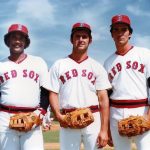
STRETCH DRIVE
Over the next 2 ½ weeks the Red Sox lost 14 out of 17 games. The 14 losses included a demoralizing four game sweep by the Yankees at Fenway Park, and two straight losses to New York at Yankee Stadium. When Dennis Eckersley took the mound at the Stadium on Sunday afternoon, September 17, the Red Sox were in second place, three and one-half games behind the Yankees.
“Oh man, that game was intense,” Eckersley remembers. “We knew we had to win that game or it was all over. That was my biggest game of the year. Everyone had written us off, and you couldn’t blame them. We had played terrible. Everyone had given up except the players. We thought we could still do it.”
In Houdini-like fashion, the Red Sox sprang back to life, defeating the Yankees 7-3 as Eckersley won his 17th game, aided by a Bob Stanley save. Over the next week the reborn Red Sox took five out of seven games to move within one game of the Yankees. When Dennis Eckersley won his 20th game 5-1 over Toronto in the next-to-last game of the season, the Red Sox were still hanging on, one game behind the Yankees. Luis Tiant’s 5-0 win over the Blue Jays the following day, coupled with a New York loss, created the historic playoff game with the Yankees.
“That playoff game was serious business. I was so nervous I kept pacing between the dugout and the clubhouse. I saw Bucky Dent’s home run on a TV monitor in the clubhouse. NBC had put up a set for the post-game interviews and after the home run they started taking it down. I started yelling at them, ‘Hey, don’t do that. It’s not over.’ And it wasn’t, but we couldn’t quite pull it out.
“That loss was heartbreaking. But I was proud that we wouldn’t quit. And I had it in my mind that we were going to be a dominant team for years. That made it easier to take. When you’re young you think things will go on indefinitely.”
BIG LEAGUE DREAMING
Dennis Eckersley grew up in the Oakland, California, area, hoping for a career in major league baseball. “As far back as I can remember my dream was to play major league baseball. I played all sports and living in Oakland I dreamed of growing up to be John Brady, Rick Barry and Juan Marichal. But I picked the right sport. When I think how I have gotten to know all three of my boyhood heroes, I realize how lucky I have been.
“I would get to two or three games a year to watch the Giants play in Candlestick Park. I grew up watching stars like Marichal, Willie Mays, Orlando Cepeda, and the Alous. It was great.”
Eckersley signed a minor league contract with the Cleveland Indians as a 17 year-old just out of high school. “It was a good decision. I only spent three years in the minors and I made it to the big leagues by age twenty. If I had signed with someone like the Dodgers with a lot of depth, it might have taken me five or six years to get to the majors.”
He began his rookie season in the bullpen for Frank Robinson’s Indians. He still treasures the memory of his first big league start. “It was against the Oakland A’s and I pitched a three-hit shutout. Having grown up in Oakland, to shut out the world champion A’s was a huge thrill. I remember feeling like I belonged in the big leagues. I’ll never forget it.”
His 13 wins earned him Rookie Pitcher of the Year honors for the American League. He followed up with 13 more wins in 1976, including 9 complete games. The next season he pitched a no-hitter out-dueling Angels’ ace Frank Tanana.
“Jerry Remy was on deck when I got the final out and he loves to tell the story of how I was screaming at the last hitter, Gil Flores, to get in the batters’ box so I could get my no-hitter over with. It wasn’t quite like that. I wasn’t that cool.
“The photographers were all scrambling to get a picture of the last out and he [Flores] was looking around to figure out what the commotion was. I was just telling him to forget about that and get in to hit. Now that I think about it though, I was pretty cocky.”
NEXT STOP: KENMORE SQUARE
Dennis Eckersley followed his 20 wins in 1978 with 17 wins and 17 complete games in 1979. His ERA of 2.99 led the team and ranked seventh in the American League. He finished fourth in the Cy Young Award voting.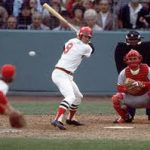
“My early years with the Red Sox were very good and the fans were great to me. I pitched here with the Indians and I remember thinking, ‘these fans are something else. They are really intense.’ But I didn’t know just how intense they really are until I got here. It might have been just as well.”
In 1980 his win total dropped to 12 but it was still good enough to lead the Red Sox staff. He also topped the staff in complete games and strikeouts. There was a work stoppage the following season and Dennis managed 9 wins in just 23 starts.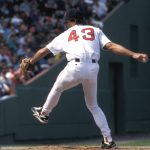
Eckersley rebounded for 13 wins in 1982 and he was named to the American League All-Star team for the second time. “I got to start the All-Star Game for the American League that year. That is every starting pitcher’s dream and I am very proud of it. But I had pitched a lot of innings over the years, especially 1977-79, and I was starting to wear down.
“In 1983 I was just awful. I stunk. My arm wasn’t right and I hadn’t taken care of myself the way I should have. The Boston fans booed me right out of the ballpark. And rightfully so. It hurt and it humbled me but I deserved every boo I got, the way I pitched.”
Dennis Eckersley’s ERA of 5.61 in 1983 looks like a misprint for a career that averages 3.50. And things only got worse in early 1984 with the Red Sox. On May 25, 1984, he was traded to the Chicago Cubs for first baseman Bill Buckner.
“Under the terms of my contract I could have vetoed that trade. But I knew I needed a change of scene, a fresh start. I think Buckner felt the same way about Chicago. It worked out well for me.”
The friendly confines of Wrigley Field proved beneficial to Eckersley as he cut his ERA in half and contributed 10 wins to help the Cubs earn a rare postseason appearance. “I enjoyed my time in Chicago. The fans are similar to the Boston fans. Maybe not quite as intense but just as passionate about their team.”
In 1985 he won 11 games for the Cubs and finished in the top 10 in the National League in five pitching categories. But in 1986 he won only six games in 32 starts and the Cubs traded him to the Oakland A’s on April 3, 1987, for three minor league pitchers. At age 32 with 12 big league seasons behind him, Dennis Eckersley’s baseball career appeared to be winding down.
SECOND CHANCE
“The Cubs didn’t know what they were giving up. They couldn’t have known really. During the off-season I had decided to change my life and I went through rehab and got sober. When I came through it successfully I knew I had a second chance and I was a man on a mission. I felt like I was 25 years old again. I knew that most people don’t get a second chance and I was determined to make the most of it. I turned my life and career around.
“When I got to Oakland I still wanted to start. But Tony LaRussa [A’s manager] put me in the bullpen. I figured I could work my way back to the starting rotation. They used me to close in the second half and I had something like 13 saves but I still thought I could start.
“Before the next season Tony had a talk with me. He told me the A’s had just picked up Bob Welch [former Dodger star pitcher]. All I said was ‘Well, I guess I’m not going to start.’”
Dennis Eckersley may have been a reluctant closer but over the next five seasons he would emerge as the dominant closer in the game. In 1988 he appeared in 60 games for the A’s and recorded 45 saves, 1 short of the major league record. He had 70 strikeouts in just 73 innings and amazingly, he walked only 11 batters. When his four victories in relief are added to his save total, he accounted for almost half of Oakland’s 104 wins as the A’s easily won the American League’s Western division.
The 1988 American League Championship Series matched the A’s against the Boston Red Sox. Eckersley was even more dominant in this playoff series, saving all four Oakland victories in the A’s sweep of the Red Sox.
Told that his late-inning appearances caused many Red Sox fans to consider an early departure from Fenway Park, Dennis can only laugh. “It wasn’t that way for me at all. I might have looked confident but remember, I still lived here. And it was only a few years earlier that the fans had booed me out of town. I knew how much the fans wanted to see their team win and see me humbled. I didn’t think it was easy in any way. I knew how dangerous those Red Sox hitters were. It was awfully sweet to get those four saves, but it wasn’t easy. Not for a minute.”
Dennis Eckersley went directly from a career high to a career low. The victorious A’s were heavily favored to defeat the Los Angeles Dodgers in the World Series that followed, and Oakland had their ace closer on the mound with a one run lead in the opening game. In one of the more dramatic moments in World Series history, injured Dodgers’ star Kirk Gibson hobbled to the plate and drove an Eckersley pitch into the right field bleachers for a game-winning, two-run homer. The Dodger players and their fans went into a frenzied celebration, while Dennis and his Oakland teammates stood by in shock.
“I have had people ask me: ‘How could you ever recover from that?’ I tell them, ‘Listen, I was just lucky to be in that spot.’ After you have been through what I had, it was amazing that I had a chance to be standing there. And I’m very proud of the fact that I saved more than 300 games after that experience. But man, did he ever hit that ball. It got out of there in a hurry.
“I’ve been together with Kirk Gibson a lot of times since. We’ve done card shows and other things together. We laugh and kid about it now, but it really hurt at the time. It was very humbling.”
Dennis acknowledges that he has finally gotten around to watching the replay of the game on ESPN Classic Sports. “I had seen the replay of the home run 1,000 times. It follows me around wherever I go, I think. But I hadn’t watched the game again until fairly recently. Mostly I couldn’t get over how young I looked.”
PREMIER CLOSER
In 1989 Dennis had 33 saves, third best in the American League, to go along with four wins. His ERA for the season was a sparkling 1.56. His control continued to be extraordinary, walking only three batters while striking out 55 in 57 innings. He saved three games in the A’s American League Championship Series win over Toronto. Then the Oakland A’s headed to the World Series against their Bay Area rivals, the San Francisco Giants.
“That was the year of the earthquake and baseball didn’t seem all that important any more. We had 10 days between games and our focus was on our friends and the community. But when the Series resumed I had one my greatest baseball experiences. We ended up sweeping the Giants in four games and I made the final putout of the Series covering first base.
“There I was standing on first base with the ball. We’ve just won the World Championship and I’m looking around Candlestick Park thinking how I used to go there as a kid to watch my heroes. My dream then was to become a big league player and here I was out on the field. That was my absolute highlight in baseball.”
Dennis Eckersley was 35 years old when the 1990 season began but he was just reaching his prime as the premier closer of his era. He appeared in 63 games that season, saving 48 of them and winning 4 games. He was selected to the American League All-Star team for the fourth time, his second selection as a relief pitcher.
His earned run average of 0.61 in 1990 is not a misprint: he gave up only five earned runs all season, or fewer than one per month. To go with his meager five earned runs, he parceled out a miserly four walks while striking out one batter for each inning pitched.
“I was in a zone for most of that time. I had a lot to prove and a lot of time to make up for. I really was at a point where I felt I could put the baseball exactly where I wanted it. Right on the corner of the corner, set up the fastball, turn the ball over to get a grounder. Everything was working for me. It was almost like magic.”
The Oakland A’s swept the Eastern Division champion Boston Red Sox in four straight games for the second time in three years in the 1990 American League Championship Series, and Dennis Eckersley picked up two more postseason saves. But the A’s were on the other end of a sweep in the World Series, when the Cincinnati Reds upset them.
In 1991 Eckersley had 43 saves to become the first American League pitcher with 40 or more saves in 3 seasons. He struck out more than one batter per inning that year while walking only nine batters in 76 innings of work.
MVP AND CY YOUNG AWARD WINNER
The 1992 season was arguably Dennis Eckersley’s best year. His 51 saves and 7 wins earned him the American League MVP Award, the Cy Young Award as the American League’s best pitcher, and the Rolaids American League Relief Pitcher Award. The total of his saves plus wins accounted for 60 percent of the A’s victories that season. Although the A’s lost the American League Championship in six games to Toronto, Eckersley picked up a save and finished his fifth straight postseason series without issuing a walk.
“As good as I was for those five years, I was always aware of the slim margin of victory. Every appearance was precious to me because I realized how close defeat was. I walked that fine line realizing that something could go wrong. I cared very deeply about my performance. God gave me another chance and I wasn’t going to waste it.”
In 1993 Eckersley’s achievements went from the level of “otherworldly” to above the average for mere mortals. His 36 saves ranked fifth in the American League and while he managed to strike out 80 batters while walking only 13 in 67 innings, he was no longer invincible. He slipped to 19 saves in the strike-shortened 1994 season, but he rebounded for 29 saves in 1995 at age 40. On May 4, 1995, Eckersley made his first fielding error in over eight seasons. His string of 470 errorless games established a record for major league pitchers.
“When I pitched badly I couldn’t sleep that night. Most players tell you that they leave their mistakes at the ballpark but I don’t think that’s true. At least it was never true for me. I wouldn’t have wanted to live with me after a tough loss. You have to care.”
In February 1996 Dennis Eckersley was traded by Oakland to the St. Louis Cardinals. The trade reunited him with manager Tony LaRussa and rejuvenated his career. He saved 30 games for the Cardinals in 1996, helping them to the postseason. The Cardinals swept the Padres three straight in the first round of the playoffs and Dennis saved all three games. The Cardinals lost the National League Championship Series to the Atlanta Braves in seven games but Eckersley did not allow an earned run in three appearances and he picked up his fifteenth postseason save.
In 1997, at age 42, Dennis Eckersley saved 36 games for the St. Louis Cardinals, the fourth-best save total in the National League. This brought his career saves to 389, the third highest total in major league history. A free agent at the end of the season, he signed with the Boston Red Sox in December.
“It was great to finish up in Boston. A lot had happened to me during the 14 seasons I had played for other teams. Most of it for the better. I came back to Boston a different person than when I left.”
He made 50 relief appearances for the Red Sox in 1998. On September 26 the crowd at Fenway Park gave him a standing ovation as he took the mound for appearance number 1,071. Dennis Eckersley had broken Hoyt Wilhelm’s major league record for career pitching appearances. He announced his retirement from baseball in an emotional press conference on December 10, 1998.
Asked if he had watched the 46 year-old Jessie Orosco, wondering if he could still pitch at the major league level, Eckersley responded, “I pitched for 24 years in the major leagues. I was lucky I had baseball to change my life. It was a good run. You miss some things because the game is all consuming. There are things outside of baseball that I need to attend to. I miss the game and I’m still adjusting but it’s time to work on being a good person. I’m more of a whole person now.”
HALL OF FAME NUMBERS
When Dennis Eckersley was first eligible for baseball’s Hall of Fame in January 2004, other strong candidates for election included first-timers Paul Molitor and Joe Carter. Holdovers Jim Rice, Andre Dawson, and Bruce Sutter, who had drawn strong support in previous elections, were also strong contenders.
When you combined his 197 career wins and 390 saves in 2004, Dennis Eckersley has contributed to more victories than any other pitcher in major league history. He was elected to The Hall in his first year of eligibility with 83% of the vote. He ranks in the top 100 in major league history in eight significant career categories [see box]. “It was an amzing thrill to be voted into the Hall of Fame,” Dennis remembers. “It still is,” he says.
The Eck was among the 100 players selected for the All-Century Team that was introduced at Fenway Park before the 1999 All-Star Game. “It was an unbelievable thrill to be out there with all those great players,” Eckersley said. “To be on the same field with Ted Williams and my boyhood heroes. I was standing right out there next to Roger Clemens. It was an incredible feeling.”
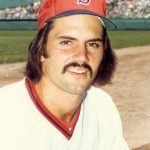 Asked what single person has influenced him the most over the years, he reflected briefly and responded emphatically, “That would have to be my father. My father continually reminded me that I was as good as anyone else. Not that I was better than anyone else, but that no one was better than me. That thought has stayed with me my whole life, in every kind of situation. Yes, it would have to be my father, Wallace Eckersley.”
Asked what single person has influenced him the most over the years, he reflected briefly and responded emphatically, “That would have to be my father. My father continually reminded me that I was as good as anyone else. Not that I was better than anyone else, but that no one was better than me. That thought has stayed with me my whole life, in every kind of situation. Yes, it would have to be my father, Wallace Eckersley.”
One thing is certain: in the hearts and minds of Boston Red Sox fans, Dennis Eckersley will always be a Hall of Famer on and off the field..
–END–
**********************************************************************************************************************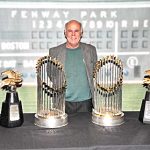
|
Dennis Eckersley’s Rank In Major League Baseball History |
||
CATEGORY |
NUMBER |
ALL-TIME MAJOR LEAGUE RANK |
| Games Pitched |
1,071 |
5th |
| Saves |
390 |
9th |
| Games Finished |
577 |
23rd |
| Strikeouts |
2,401 |
49th |
| WAR for Pitchers |
62 |
52nd |
| Innings |
3,286 |
97th |
|
SOURCE: 2024 www.baseball-reference.com |
||


Leave A Comment